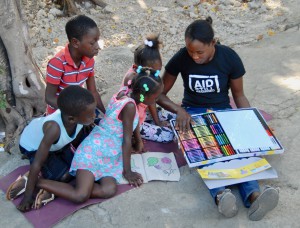Several studies are pointing the way to achieving self-sufficiency in developing communities by attending to family behaviors and nutrition during early childhood.
In most marginalized communities, even those in industrialized nations, parenting practices generally parallel economic level. Kids in at-risk communities are far more likely to be neglected or treated with disdain or violence, whereas children in wealthier climes are generally treated with regard, included in family events on a near equal basis, and empowered to become their own agents beginning at an early age.
 Some of the differences between the two groups are due to educational backgrounds (e.g. illiterate parents can’t read to their children nor have they seen much outside of their immediate communities to communicate worldly experiences) and behavioral sophistication (e.g. it’s easier to maintain control by corporal means). The good news is, no matter what level a family starts at, training that engenders self-motivation and grit, and opens a wide range of possibilities in children is equally successful across demographic strata.
Some of the differences between the two groups are due to educational backgrounds (e.g. illiterate parents can’t read to their children nor have they seen much outside of their immediate communities to communicate worldly experiences) and behavioral sophistication (e.g. it’s easier to maintain control by corporal means). The good news is, no matter what level a family starts at, training that engenders self-motivation and grit, and opens a wide range of possibilities in children is equally successful across demographic strata.
Harlem Children Zone founder, Geoffrey Cambridge (featured in the documentary Waiting for Superman), found most kids entering his kindergarten were too impaired by experiences in their early years to be ready for school, or to succeed later in life for that matter. He was frustrated that he was offering a profound educational system to children who were carrying emotional scars and who could not focus well. Cambridge began demanding his students begin kindergarten at three, then two years of age, to where his students (and their moms) now attend “Baby College” beginning at age one. And still he finds one-year olds in rough shape.
Aid Still Required is working on a model dubbed “The First 20 Years” where straightforward, powerful interventions begin before conception and carry through high school. We look to engage prospective parents in conscious family planning (why do you want kids?, are you equally happy with either gender?, can you afford a family now?, what is your nutrition plan for the gestating mother and child?), and in growth-oriented family behavior practices during early childhood (engaging children with activities, treating them with respect and dignity, challenging them with thought and activities) and onwards through their kids’ first few decades.
None of this is rocket science. The knowledge and systems are readily available. If piece together into a cohesive whole and administer them with love and flair, these skill sets can set a new foundation in emerging communities.
 Aid Still Required
Aid Still Required